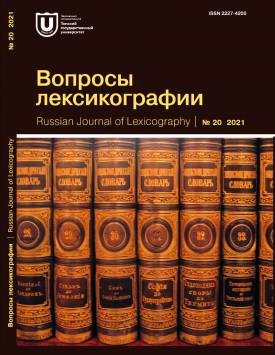Markup Fragment in the RuTuBiC Linguistic Corpus. Code-Switching or Lexical Borrowing?
The article presents a solution to one of the problems of special linguistic markup in the RuTuBiC corpus - the Russian Speech Corpus of Russian-Turkic Bilinguals, associated with error annotation at the lexical level. The corpus includes three subcorpuses representing materials of the Russian speech of Shor-Russian, Tatar-Russian and Khakass-Russian bilinguals. The article presents solutions developed on the basis of all subcorpuses; the illustrative contexts are drawn from the Shor-Russian subcorpus, recordings of interviews with 14 respondents, about 20 hours of sound. The recordings were made during expeditions to Shoria in 2017-2019. Bilingualism of the respondents is defined as early natural bilingualism with the dominance of the second Russian language, mother tongues are languages of the family heritage. The theoretical basis of the research was works on linguistic contact at the lexical level. Solutions based on the differentiation of lexemes fully mastered by the system of standard Russian and units with the status of borrowings from other subsystems of the national language and other languages are proposed. In the latter case, linguistic and contextual features are distinguished that oppose lexical borrowing and code-switching. The typical errors singled out at the lexical level are: [LexId] - idiomatic expressions that are not fixed in the standard language (dialectal and vernacular, slang, etc.), they can also be Turkic calques; [LexSem] - general Russian words used in meanings different from those fixed in the normative sources; [LexSemAgr] - violations of the lexical and semantic agreement norms. The units borrowed from the mother tongue of the respondents are located on the scale of transitions from nuclear to borderline. The nuclear units marked with the [Lex] tag are dialectal units, common words, other word usage cases that are outside the standard, as well as borrowings from the Turkic languages that are not included in the dictionaries of standard Russian. On the border “to the left” are borrowings assimilated to different degrees. On the border “to the right” are non-assimilated borrowings and code-switches. The [CodeSw] marks code-switching, insertion of mother tongue elements into Russian speech. The author considers the inclusion of statements as nuclear cases of code-switching, and single lexical inclusions as transitional cases. Code-switching is evidenced by metatext and linguistic proper, primarily phonetic, indicators. There is an insignificant number of both lexical borrowings and cases of code-switching in the speech of the respondents of the RuTuBiC corpus, which depends on the type of bilingualism. The typicality of metatext marking of borrowings and code-switches is determined by the discursive, genre and thematic limitations of the corpus.
Keywords
lexical borrowing,
code-switching,
Shor-Russian bilingualism,
Turkic-Russian bilingualism,
text corpus,
annotation,
deviation from speech standardAuthors
| Rezanova Zoya I. | Tomsk State University | rezanovazi@mail.ru |
Всего: 1
References
Немзер У. Проблемы и перспективы контрастивной лингвистики // Новое в зарубежной лингвистике. М., 1989. Т 25. С. 128-144.
Чойбонова Б.М. Влияние межъязыковой и внутриязыковой интерференции на формирование ошибок в речи обучаемых // Вестник Бурятского университета. 2009. № 11. С. 157-162.
Слама-Казаку Т. Методика психолингвистического исследования при контрастивном анализе. Корпус языковых факторов, полученных в процессе обучения языку: корпус ошибок и их иерархия // Психолингвистика : сб. ст. / под ред. А.М. Шахнаровича. М., 1984. С. 283-306.
Резанова З.И., Дыбо А.В. Отклонения от речевого стандарта в региональном варианте устной русской речи: внутриязыковое и межъязыковое взаимодействие // Русин. 2020. № 62. C. 144-158. DOI: 10.17223/18572685/62
Галямина Ю.Е. Структурные типы переключения кодов в речи носителей исчезающих языков (на материале кетского и эвенкийского языков) // Вестник Томского государственного педагогического университета. 2012. № 1 (116). С. 96-100.
Резанова З.И., Темникова И.Г., Некрасова Е.Д. Динамика социолингвистических процессов в Южной Сибири в зеркале билингвизма (русско-шорское и русско-татарское языковое взаимодействие) // Вестник Томского государственного университета. 2018. № 436. С. 56-68. DOI: 10.17223/15617793/436/7
Poplack S. Sometimes I’ll start a sentence in Spanish y teimino en espanol // Linguistics. 1980. № 18. P 581-618.
Muysken P. Bilingual speech: a typology of code-mixing. Cambridge : Cambridge University Press, 2000. xvi+306 p.
Myers-Scotton C. Social Motivations for Code-Switching: Evidence from Africa. New York : Oxford University Press, 1993. xii, 177 p.
Gardner-Chloros P. Code-Switching and Language Change // The Handbook of Language Contact / еd. by R. Hickey. P 188-208.
Балакина Ю.В., Соснин А.В. Теоретические основы переключения кодов и функционирования заимствований с позиций контактной лингвистики // Вестник Воронежского государственного университета. Сер. Лингвистика и межкультурная коммуникация. 2015. № 2. С. 5-11.
Языки России в контакте с русским языком II. 11-13 февраля 2021 г. : тез. конф. / Ин-т русского языка им. В.В. Виноградова РАН, Ин-т языкознания РАН; М.-Э.А. Винклер, Е.В. Кашкин, О.А. Казакевич, А.Б. Летучий, Н.М. Стойнова, О.В. Ханина, И.А. Хомченкова. М., 2021. 92 с.
Lipski J.M.Spanish-English code-switching among low-fluency bilinguals: Towards an expanded typology // Sociolinguistic Studies. 2014. Vol. 8, № 1. Р. 23-55. DOI: 10.1558/sols.v8i1.23
Резанова З.И. Подкорпус устной речи русско-тюркских билингвов Южной Сибири: типологически релевантные признаки // Вопросы лексикографии. 2017. № 11. С.105-118.
Копотев М. Введение в корпусную лингвистику. Прага : Animedia Company, 2014. 194 с.
Азимов Э.Г., Щукин А.Н. Проблемы лексикографического описания лингводидактической терминологии // Вопросы лексикографии. 2018. № 14. С. 5-23. DOI: 10.17223/22274200/14/1
Казакевич О.А. Документация исчезающих языков Сибири (на материале двух поселков Красноярского края) // Вестник Российского гуманитарного научного фонда. 2006. № 3 (44). С. 221-231.
Marian V, Blumenfeld H.K., Kaushanskaya M. The Language Experience and Proficiency Questionnaire (LEAP-Q): Assessing language profiles in bilinguals and multilinguals // Journal of Speech, Language, and Hearing Research. 2007. Vol. 50, № 4. P. 940-967.
Ефремова Т.Ф. Новый толково-словообразовательный словарь русского языка. М. : Рус. яз., 2000. Т 2. 1084 с.
Словарь русских народных говоров. М. : Наука, 2007. Вып. 41. 343 с.
Елистратов В.С. Словарь русского арго. ГРАМОТА.РУ 2002. URL: https://rus-russian-argo.slovaronline.com (дата обращения: 01.03.2021).
Толковый словарь русского языка / под ред. Д.Н. Ушакова. М. : Гос. изд-во иностр. и нац. слов, 1940. Т 4. 1502 с.

